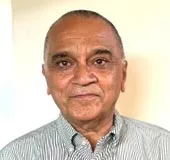Clothes truly make a man. Finance Minister Arun Jaitley's budget, presented to Parliament today, turned out to be constructed the manner in which he was dressed -- a Modi jacket over a shirt, trousers and chappals (flip flops) for shoes. Nothing objectionable of course and yet unexceptional.
West Bengal and Bihar, the states which go to the polls soon, will receive special central assistance in addition to the increased allocation they have already got per the recommendations of the Finance Commission. This explains the renewed bonhomie between the BJP and Nitish Kumar and Didi (Mamta Banerjee) respectively, Chief Ministers of Bihar and West Bengal.
Fiscal devolution kick starts Cooperative Federalism
The biggest plus from the budget is implementation of the spirit of "cooperative federalism" by transferring 42% of Union tax proceeds to states from around 32% earlier, per the recommendations of the Finance Commission.
Transfer of an additional 20% as central grants will further boost total transfers to states to 62% of Union tax revenues. This "big bang reform" in fiscal devolution sets the stage for State governments to take direct responsibility of the functions allocated to them under the constitution. They can no longer plead a lack of resources.
FM Jaitley is right that reform is a year around activity and does not begin and end with budget promises. Let us hope he walks the talk. The biggest public service he could render is to make the budget presentation process devoid of "news value" by following a year around dialogue with stakeholders and continuous results on basic reform steps.
This was a budget without many surprises. Maybe we have evolved to being an economy, in which the budget is a mundane, technical exercise, of interest to economists and accountants, but of little immediate consequence for those who live in the real world.
(The writer is an Advisor to Observer Research Foundation, Delhi)
The views expressed above belong to the author(s). ORF research and analyses now available on Telegram! Click here to access our curated content — blogs, longforms and interviews.

